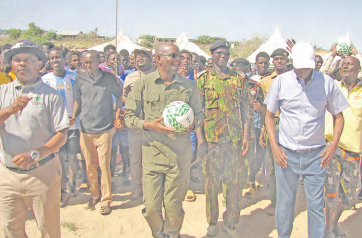
The Gabra and Dassenach communities in Marsabit have agreed to put their differences aside and coexist peacefully after decades of bloody intercommunal fights.
On Tuesday, a peace meeting was held and a tournament that brought together at least six soccer teams from both sides of the two communities in Illeret.
North Horr MP Wario Guyo, who initiated the last phase of the peacebuilding process, called on the residents to foster and uphold peaceful coexistence.
Guyo presided over the peace meeting between the councils of elders from the two rival communities.
He underscored the need for concrete action to end conflicts among all communities in Marsabit county to ensure longstanding peace and harmonious existence.
He outlined peacebuilding and cementing permanent good relations between the Gabbra and Dassenach communities as one of his key areas of New Year resolutions.
Among the strategies proposed was the prioritisation of peaceful settlement of conflicts, conflict prevention and the enhancement of the implementation efforts to curtail any potential spiral of violence fueled by the illicit circulation of small firearms which had continued to threaten peace along the Ethiopia-Kenya border.
Guyo also revealed that plans were underway to hold yet another peace meeting in February in North Horr town and facilitate the Dassenach youths and the elders to pay their Gabbra counterparts a visit and interact with them as it happened when the Gabbras paid a visit to the Illeret area.
The legislator added that he was keen on working collaboratively with all the community members to examine the achievement gaps and challenges that had continued to hinder the realisation of long-lasting peace in North Horr constituency.
“We are currently barnstorming on the most appropriate approaches and frameworks that can help us permanently silence guns forever in North Horr constituency, “Guyo said.
Gabra Peace Committee elder Hero Elema who attended the peace meeting and tournament said that he was glad that the event was fruitful.
“We hail the approach taken by the area MP Mr Wario Guyo and efforts deployed to permanently silence guns among the members of the Gabbra and Dassenach communities,” Elema said.
Dassenach Peace Committee elder Mike Kesho praised the leveraging of sports for advocacy for peace and reconciliation to promote social integration among the community members.
Kesho detailed how the process that was initiated by the local NGOs and later Catholic church faced several hurdles and continually flopped.
He hailed the roping in of the younger generation in the reconciliation process as a powerful means by which longstanding peace and healing could be achieved after decades of brutal wars, mass atrocities among the two communities.
Illeret Catholic priest Fr Benedict Mukavi, who had been among the key initiators of the current peacebuilding phase, was optimistic and was convinced that the current developments signaled longstanding peace between the erstwhile rival communities.
He was glad that the two communities had finally agreed to iron out the differences between them to an extent that Gabbras who not see the Dassenachs eye to eye can easily pay a visit and spend nights in the Dassenach’s houses.
He reminisced how the inter-tribal clashes and animosity between the two communities had become perennial for decades.
He said the reconciliation processes needed to evolve to the fostering of intercommunity marriages to reflect today’s modern civilisation.
The pastoralist dry lands of northern Kenya have long been associated with marginalisation, inter-communal conflict and adverse human development indicators.
Some of the historical stress factors have been studied and documented, and these include climate change and environmental degradation; drought, famine and other natural catastrophes; resource and land related conflicts (some relating to administrative and electoral boundaries).
Other factors are the proliferation of small arms and light weapons; and human-wildlife conflicts aggravated by competing uses of land for private conservancies and wildlife conservation.
In Marsabit county, conflicts have
become increasingly insidious involving the major ethnic groups.















